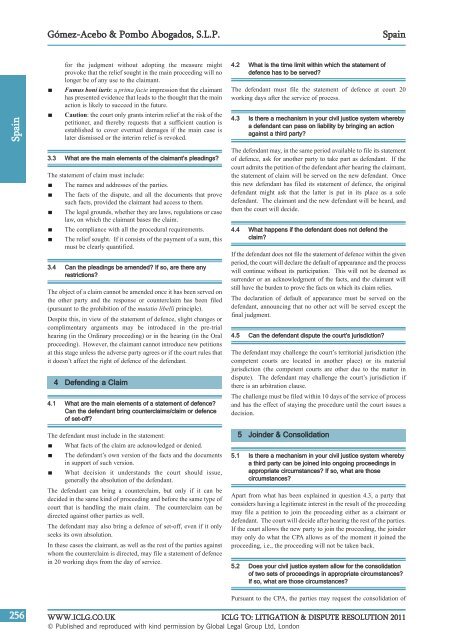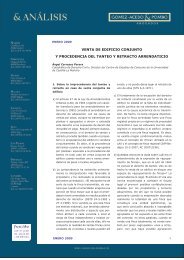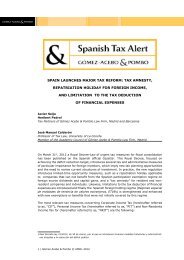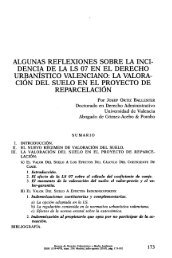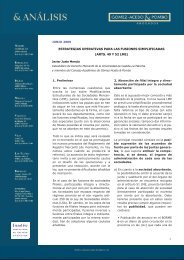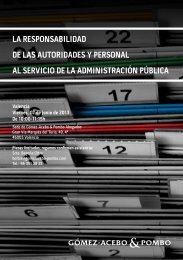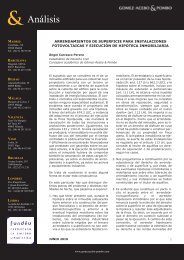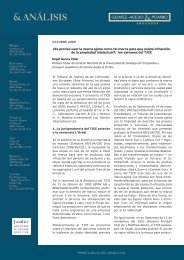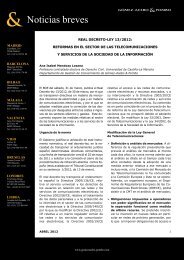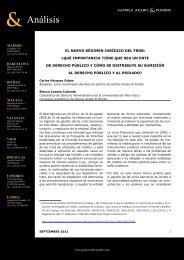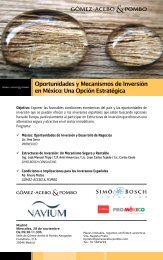the international comparative legal guide to litigation - dispute ...
the international comparative legal guide to litigation - dispute ...
the international comparative legal guide to litigation - dispute ...
You also want an ePaper? Increase the reach of your titles
YUMPU automatically turns print PDFs into web optimized ePapers that Google loves.
Gómez-Acebo & Pombo Abogados, S.L.P.<br />
Spain<br />
Spain<br />
for <strong>the</strong> judgment without adopting <strong>the</strong> measure might<br />
provoke that <strong>the</strong> relief sought in <strong>the</strong> main proceeding will no<br />
longer be of any use <strong>to</strong> <strong>the</strong> claimant.<br />
Fumus boni iuris: a prima facie impression that <strong>the</strong> claimant<br />
has presented evidence that leads <strong>to</strong> <strong>the</strong> thought that <strong>the</strong> main<br />
action is likely <strong>to</strong> succeed in <strong>the</strong> future.<br />
Caution: <strong>the</strong> court only grants interim relief at <strong>the</strong> risk of <strong>the</strong><br />
petitioner, and <strong>the</strong>reby requests that a sufficient caution is<br />
established <strong>to</strong> cover eventual damages if <strong>the</strong> main case is<br />
later dismissed or <strong>the</strong> interim relief is revoked.<br />
3.3 What are <strong>the</strong> main elements of <strong>the</strong> claimant’s pleadings?<br />
The statement of claim must include:<br />
The names and addresses of <strong>the</strong> parties.<br />
The facts of <strong>the</strong> <strong>dispute</strong>, and all <strong>the</strong> documents that prove<br />
such facts, provided <strong>the</strong> claimant had access <strong>to</strong> <strong>the</strong>m.<br />
The <strong>legal</strong> grounds, whe<strong>the</strong>r <strong>the</strong>y are laws, regulations or case<br />
law, on which <strong>the</strong> claimant bases <strong>the</strong> claim.<br />
The compliance with all <strong>the</strong> procedural requirements.<br />
The relief sought. If it consists of <strong>the</strong> payment of a sum, this<br />
must be clearly quantified.<br />
3.4 Can <strong>the</strong> pleadings be amended? If so, are <strong>the</strong>re any<br />
restrictions?<br />
The object of a claim cannot be amended once it has been served on<br />
<strong>the</strong> o<strong>the</strong>r party and <strong>the</strong> response or counterclaim has been filed<br />
(pursuant <strong>to</strong> <strong>the</strong> prohibition of <strong>the</strong> mutatio libelli principle).<br />
Despite this, in view of <strong>the</strong> statement of defence, slight changes or<br />
complimentary arguments may be introduced in <strong>the</strong> pre-trial<br />
hearing (in <strong>the</strong> Ordinary proceeding) or in <strong>the</strong> hearing (in <strong>the</strong> Oral<br />
proceeding). However, <strong>the</strong> claimant cannot introduce new petitions<br />
at this stage unless <strong>the</strong> adverse party agrees or if <strong>the</strong> court rules that<br />
it doesn’t affect <strong>the</strong> right of defence of <strong>the</strong> defendant.<br />
4 Defending a Claim<br />
4.1 What are <strong>the</strong> main elements of a statement of defence?<br />
Can <strong>the</strong> defendant bring counterclaims/claim or defence<br />
of set-off?<br />
The defendant must include in <strong>the</strong> statement:<br />
What facts of <strong>the</strong> claim are acknowledged or denied.<br />
The defendant’s own version of <strong>the</strong> facts and <strong>the</strong> documents<br />
in support of such version.<br />
What decision it understands <strong>the</strong> court should issue,<br />
generally <strong>the</strong> absolution of <strong>the</strong> defendant.<br />
The defendant can bring a counterclaim, but only if it can be<br />
decided in <strong>the</strong> same kind of proceeding and before <strong>the</strong> same type of<br />
court that is handling <strong>the</strong> main claim. The counterclaim can be<br />
directed against o<strong>the</strong>r parties as well.<br />
The defendant may also bring a defence of set-off, even if it only<br />
seeks its own absolution.<br />
In <strong>the</strong>se cases <strong>the</strong> claimant, as well as <strong>the</strong> rest of <strong>the</strong> parties against<br />
whom <strong>the</strong> counterclaim is directed, may file a statement of defence<br />
in 20 working days from <strong>the</strong> day of service.<br />
4.2 What is <strong>the</strong> time limit within which <strong>the</strong> statement of<br />
defence has <strong>to</strong> be served?<br />
The defendant must file <strong>the</strong> statement of defence at court 20<br />
working days after <strong>the</strong> service of process.<br />
4.3 Is <strong>the</strong>re a mechanism in your civil justice system whereby<br />
a defendant can pass on liability by bringing an action<br />
against a third party?<br />
The defendant may, in <strong>the</strong> same period available <strong>to</strong> file its statement<br />
of defence, ask for ano<strong>the</strong>r party <strong>to</strong> take part as defendant. If <strong>the</strong><br />
court admits <strong>the</strong> petition of <strong>the</strong> defendant after hearing <strong>the</strong> claimant,<br />
<strong>the</strong> statement of claim will be served on <strong>the</strong> new defendant. Once<br />
this new defendant has filed its statement of defence, <strong>the</strong> original<br />
defendant might ask that <strong>the</strong> latter is put in its place as a sole<br />
defendant. The claimant and <strong>the</strong> new defendant will be heard, and<br />
<strong>the</strong>n <strong>the</strong> court will decide.<br />
4.4 What happens if <strong>the</strong> defendant does not defend <strong>the</strong><br />
claim?<br />
If <strong>the</strong> defendant does not file <strong>the</strong> statement of defence within <strong>the</strong> given<br />
period, <strong>the</strong> court will declare <strong>the</strong> default of appearance and <strong>the</strong> process<br />
will continue without its participation. This will not be deemed as<br />
surrender or an acknowledgment of <strong>the</strong> facts, and <strong>the</strong> claimant will<br />
still have <strong>the</strong> burden <strong>to</strong> prove <strong>the</strong> facts on which its claim relies.<br />
The declaration of default of appearance must be served on <strong>the</strong><br />
defendant, announcing that no o<strong>the</strong>r act will be served except <strong>the</strong><br />
final judgment.<br />
4.5 Can <strong>the</strong> defendant <strong>dispute</strong> <strong>the</strong> court’s jurisdiction?<br />
The defendant may challenge <strong>the</strong> court’s terri<strong>to</strong>rial jurisdiction (<strong>the</strong><br />
competent courts are located in ano<strong>the</strong>r place) or its material<br />
jurisdiction (<strong>the</strong> competent courts are o<strong>the</strong>r due <strong>to</strong> <strong>the</strong> matter in<br />
<strong>dispute</strong>). The defendant may challenge <strong>the</strong> court’s jurisdiction if<br />
<strong>the</strong>re is an arbitration clause.<br />
The challenge must be filed within 10 days of <strong>the</strong> service of process<br />
and has <strong>the</strong> effect of staying <strong>the</strong> procedure until <strong>the</strong> court issues a<br />
decision.<br />
5 Joinder & Consolidation<br />
5.1 Is <strong>the</strong>re a mechanism in your civil justice system whereby<br />
a third party can be joined in<strong>to</strong> ongoing proceedings in<br />
appropriate circumstances? If so, what are those<br />
circumstances?<br />
Apart from what has been explained in question 4.3, a party that<br />
considers having a legitimate interest in <strong>the</strong> result of <strong>the</strong> proceeding<br />
may file a petition <strong>to</strong> join <strong>the</strong> proceeding ei<strong>the</strong>r as a claimant or<br />
defendant. The court will decide after hearing <strong>the</strong> rest of <strong>the</strong> parties.<br />
If <strong>the</strong> court allows <strong>the</strong> new party <strong>to</strong> join <strong>the</strong> proceeding, <strong>the</strong> joinder<br />
may only do what <strong>the</strong> CPA allows as of <strong>the</strong> moment it joined <strong>the</strong><br />
proceeding, i.e., <strong>the</strong> proceeding will not be taken back.<br />
5.2 Does your civil justice system allow for <strong>the</strong> consolidation<br />
of two sets of proceedings in appropriate circumstances?<br />
If so, what are those circumstances?<br />
Pursuant <strong>to</strong> <strong>the</strong> CPA, <strong>the</strong> parties may request <strong>the</strong> consolidation of<br />
256<br />
WWW.ICLG.CO.UK<br />
ICLG TO: LITIGATION & DISPUTE RESOLUTION 2011<br />
© Published and reproduced with kind permission by Global Legal Group Ltd, London


